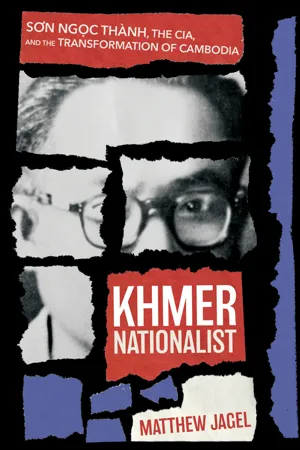
Khmer Nationalist
Sơn Ngọc Thành, the CIA, and the Transformation of Cambodia
- 228 pages
- English
- ePUB (mobile friendly)
- Available on iOS & Android
About this book
Khmer Nationalist is a political history of Cambodia from World War II until 1975, examining the central role of Sõn Ng?c Thành. It is a story of nationalistic independence movements, political intrigue, coup attempts, war, and American intelligence. The rise of Cambodian nationalism, the brief period of Japanese dominance, the fight for independence from France, and the establishment of ties with the United States that kept Sihanouk on edge until his downfall—in all of these, as Matthew Jagel shows, Thành was fundamental.
Khmer Nationalist reveals how Cambodian nationalism grew during the twilight of French colonialism and faced new geopolitical challenges during the Cold War. Thành's story brings greater understanding to the end of French colonialism in Cambodia, nationalism in post-colonial societies, Cold War realities for countries caught between competing powers, and how the United States responded while the Vietnam War intensified.
Frequently asked questions
- Essential is ideal for learners and professionals who enjoy exploring a wide range of subjects. Access the Essential Library with 800,000+ trusted titles and best-sellers across business, personal growth, and the humanities. Includes unlimited reading time and Standard Read Aloud voice.
- Complete: Perfect for advanced learners and researchers needing full, unrestricted access. Unlock 1.4M+ books across hundreds of subjects, including academic and specialized titles. The Complete Plan also includes advanced features like Premium Read Aloud and Research Assistant.
Please note we cannot support devices running on iOS 13 and Android 7 or earlier. Learn more about using the app.
Information
Table of contents
- Acknowledgments
- Introduction: A Historical Perspective
- 1 The First Independence, 1908–1945
- 2 Return to Exile, 1946–1955
- 3 Lost in the Wilderness, 1955–1959
- 4 The Breaking Point, 1960–1964
- 5 Path to Power, 1965–1970
- 6 Always an Outsider, 1970–1972
- Conclusion: An Unglamorous Ending
- Notes
- Bibliography
- Index